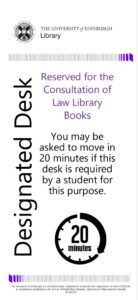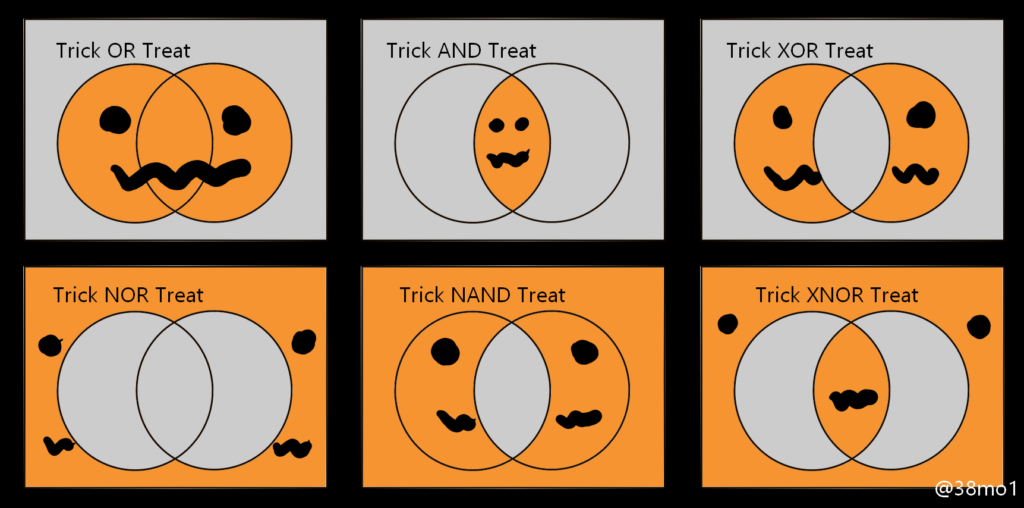One of the most common concerns for Law students at this time of year is finding study spaces in the library to help them get ready for assignments and exams. We know the Law Library is a favourite place to study, so here are some ways we’re trying to help manage during peak periods.
EXTRA STUDY SPACES:
Library Services book out other rooms in the University to help meet demand for study spaces during the revision and exam period. The spaces closest to the Law Library are the MacLaren Stuart and Quad Teaching rooms in Old College, and there are helpful signs pointing the way to these at the entrance to the Law Library:
G.158 Quad Teaching Room (seminar room, 15 seats) and G.159 MacLaren Stuart Room (large classroom, 55 seats)
Open daily from Saturday 3 December to Wednesday 21 December.
Opening hours as per Law Library opening hours: Monday to Thursday 09:00-21:50 ; Friday 09:00 to 18:50; Saturday 09:00 to 16:50 ; Sunday 12:00 to 18:50 on 4, 11, 18 December.
There are also temporary additional study spaces open at the Main Library and 40 George Square for study and revision; details can be found of these and many other study spaces across campus on the Study Spaces part of the website.
More information about opening hours for the Law Library specifically over the festive period can be found on the Law Library pages of the Library website. Please note that there are extended opening hours on Sundays in December (on 4th, 11th or 18th) until 18.50. Usual Sunday opening hours (open until 16.50) will resume in January.
STUDY MONITOR:
We’ve asked our student staff to work as study monitors from Monday 12th to Friday 16th December. They will be helping students find spaces, take counts and to monitor how the study space cards are being used.
STUDY BREAK CARDS:
Cards are situated around the library that can be used to keep your space while you take a short break. Turn the card to 15 minutes for a Short Break or fill out the time you intend to be away from your desk for longer breaks like lunch (up to one hour). This scheme has been shown to encourage healthy study patterns and help utilise the space we have available. We’ve used this system in the Law Library in the past and it’s gotten great feedback, so much so that it’s been extended to other libraries in our network.
RESERVE COLLECTION DESIGNATED DESKS (NEW):
One of the concerns we’ve heard from students is that at peak times there’s nowhere to consult Reserve (3-hour loan) materials as it’s impractical to take these items far from the library for use. We listened and are now trialling a system where the 18 desks nearest the Reserve collection on the ground floor are Designated Desks in order to use materials from the Law Library specifically. If students require use of these desks they should alert Helpdesk staff who will put out a call for those not using Law Library collections to vacate this bank of desks within 20 minutes. Signs indicating this procedure are posted on these desks.

We believe this is a compromise that can work for students who need to use materials held specifically in this library without limiting who can work and study in the space. We understand Law students can feel that they should be prioritised when it comes to space in the Law Library, however the Law Library is part of a network of 13 site libraries – including the Main Library, which also houses high use law books – and limiting access to one of these is neither possible nor fair. Law students also benefit from being able to use any of the campus library facilities – for example, did you know that the new KB nucleus is directly connected to the Murray Library and is open to everyone (including Law students)?
While we can appreciate the issues with finding space in the Law Library we find it a great compliment that so many students want to study with us. We are limited in the number of seats available but we hope you’ll understand we’re doing what we can to maintain a pleasant and peaceful study environment; the fantastic Helpdesk team are always on hand to assist where they can.
If you have queries or want to speak to someone directly about our libraries and collections, you can contact us by email: law.librarian@ed.ac.uk. We’d love to hear from you.









